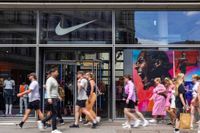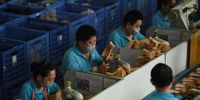Nike Stock Sinks 15% on Weak Q3 Earnings as Dow Jones Drops 4%
Nike share price has taken a dive due to tariffs, while major indices also endured heavy losses, with Dow Jones closing 4% lower.
U.S. stock markets suffered a sharp selloff on Thursday, April 3, 2025, as investors reacted to the latest round of tariffs announced by the White House. Concerns over the potential economic impact led to significant losses, with the Dow Jones Industrial Average dropping 1,679 points, a nearly 4% decline, closing at 40,546. This marked a break below key support at 40,600, pushing the index toward its next crucial level at 40,000. The S&P 500 also faced its worst single-day drop since the 2020 COVID-19 market crash, plunging 274 points (-4.8%), erasing nearly $2 trillion in market value, according to FactSet.
While not all companies are directly affected by the new tariffs, markets are beginning to price in the risk of a recession. The non-farm payroll report on Friday and Federal Reserve Chair Jerome Powell’s speech could determine whether further downside movement is ahead.
Among the hardest-hit stocks was Nike (NKE), which suffered a 15% decline, making it the worst-performing stock in the Dow Jones index. Nike’s stock collapse was driven by the high tariffs imposed on Vietnam, where the company manufactures a significant portion of its products. As a result, production costs are expected to surge, further pressuring Nike’s bottom line.
Adding to the stock’s struggles, Nike reported disappointing Q3 2024 earnings, revealing steep declines across key financial metrics. Revenue fell 9% year-over-year to $11.27 billion, impacted by weaker sales in China, Europe, the Middle East, Africa, and North America. Gross profit dropped 16% to $4.67 billion, with margins declining 330 basis points to 41.5% due to lower average selling prices and increased discounting. Pre-tax income declined 40% to $844 million, driven by falling revenues and shrinking margins. Net income fell 32% to $794 million, reflecting reduced profitability. Earnings per share (EPS) dropped 30% to $0.54, as lower revenues and margins weighed heavily on overall performance.
With mounting economic uncertainty and the impact of tariffs on global supply chains, investors remain wary of Nike’s future earnings potential. The company now faces increased pressure to adjust its manufacturing strategy or pass rising costs onto consumers, both of which could further challenge its growth trajectory.
In addition to Nike, other apparel brands also felt the heat from the tariffs. Shares of Lululemon Athletica Inc., Deckers Outdoor Corp., and Nike Inc. were among the steepest decliners among S&P 500 companies caught up in the selloff, with Deckers falling 13.7% and Lululemon dropping 9.6%.
The U.S. imposed a staggering 46% tariff on imports from Vietnam, which manufactured about half of Nike's footwear in fiscal 2024. The tariffs extended to other countries as well, with 32% on imports from Indonesia and 49% on imports from Cambodia. President Trump also announced 34% levies on imports from China, adding to previously imposed tariffs.
According to Morgan Stanley, investors are underestimating the potential impact of these tariffs. Analyst Alex Straton noted, "Potential incremental Vietnam tariffs appear under-appreciated by investors and could prove a notable headwind given significant sourcing exposure across our coverage." This sentiment was echoed by analysts from UBS, who indicated that countering the impact of the levies on Vietnam alone would require price increases of 10% to 12%.
As Nike produced half its footwear and roughly 30% of its apparel in Vietnam in its 2024 financial year, the company is now at a crossroads. The tariffs could force Nike and other brands to either renegotiate supplier contracts or pass the costs onto consumers, both of which could have long-lasting effects on their market positions.
In light of these developments, shares of Nike dropped about 10% to their lowest since 2017 on the same day, while Adidas tumbled 11% and Puma fell about 10%. The International Apparel Federation called the tariffs a "major shock" to the industry, stating, "Ultimately, someone will have to pay the price."
As the economic landscape continues to evolve, the implications of these tariffs on the apparel industry remain to be seen. Analysts warn that the scenario of shifting production now looks far less viable, narrowing the set of effective mitigation levers available to brands.
With the stock market's volatile reaction to the tariffs, investors are left grappling with the uncertainty of future earnings and the potential for increased prices on consumer goods. As companies like Nike navigate these challenges, the overarching question remains: how will they adapt to an environment marked by rising costs and shifting supply chains?







